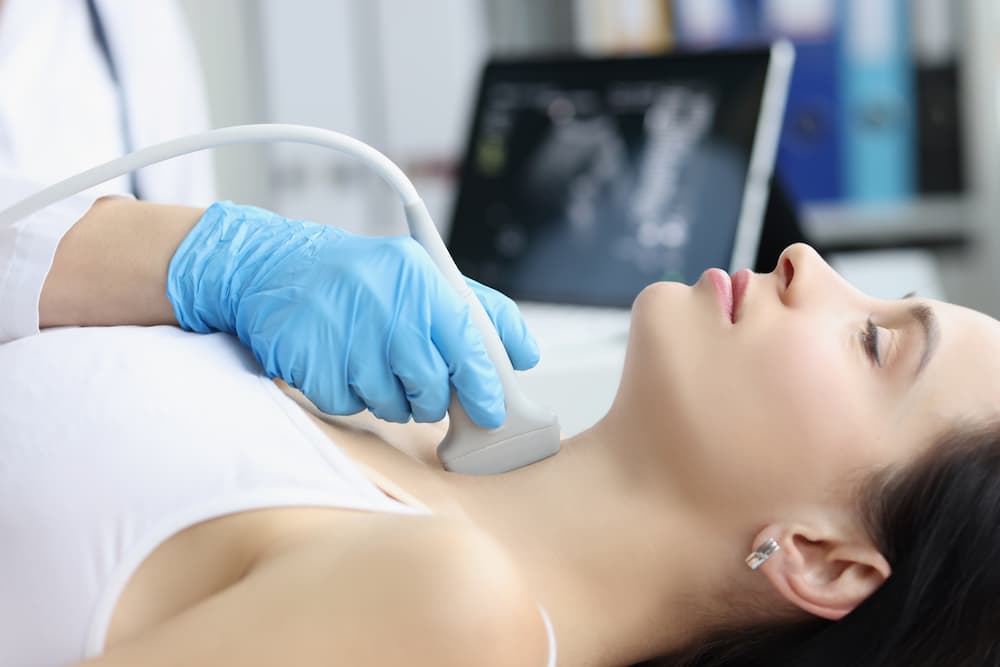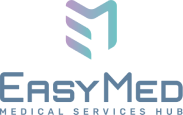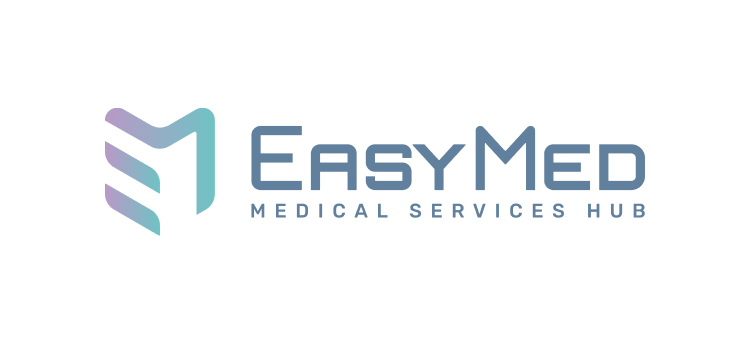
Ultrasound of thyroid gland
Thyroid ultrasound an effective diagnostic technique that provides a safe way to visualize thyroid tissue and its structure using high-frequency sound waves. This method avoids surgery and ionizing radiation, making it preferable and versatile over techniques such as X-rays and CT scans in many cases.
Дополнительные процедуры:
- Лабораторный анализ мочи
- Элемент списка #2
- Элемент списка #3
US of the thyroid gland
Indications for ultrasound of the thyroid gland
Ultrasound of the thyroid gland is recommended in the presence of several symptoms and clinical signs that indicate possible diseases or disorders of the thyroid gland. Symptoms for which an ultrasound of the thyroid gland is appropriate include:
- Symptoms of hyperthyroidism: Such as increased fatigue, sweating, hand tremors, heart palpitations, weight loss, and nervousness.
- Symptoms of hypothyroidism: Fatigue, weight gain, dry skin, feeling cold, slow heart rate, constipation, depression.
- Symptoms of thyroiditis: Acute or chronic pain in the neck, possibly accompanied by fever and general malaise.
- Nodules or swelling in the neck: Noticeable or visible changes in the thyroid area, including nodules or swelling.
- Enlargement of the thyroid gland (goiter): Noticeable enlargement in the neck area, even without pain.
- Changes in voice and swallowing: A feeling of a lump in the throat, difficulty swallowing, and voice changes that may indicate an enlarged thyroid.
- Having a family history of thyroid disease: Especially if relatives have had thyroid cancer or autoimmune thyroid disease.
- Symptoms associated with hormonal imbalance: For example, irregular menstruation, trouble conceiving, changes in libido.
- Common signs of thyroid dysfunction include deterioration of hair and nails, changes in weight, memory problems, and concentration problems.
- After radiation therapy to the neck, Especially in patients who have undergone treatment for head and neck cancer.
Importantly! If available, it is necessary to provide the ultrasound specialist with a medical history and a referral for diagnosis from the attending physician. This will allow for a more accurate interpretation of the results.
Preparation for the procedure
Preparation for thyroid ultrasound is simple and does not require complex or special procedures. Here are the main aspects of preparing for the study:
- Medical history: It is important to provide the doctor with a complete medical history, including information about current medications, the presence of allergies, especially to ultrasound gel, and previous thyroid-related diagnoses.
- Informing the doctor: If the patient has implanted medical devices or has recently undergone a medical intervention in the neck area, the doctor should be informed in advance.
- Clothing: It is necessary to wear comfortable clothing that provides easy access to the neck area. It is advisable to avoid clothing with collars or jewelry around the neck on the day of the procedure.
- Jewelry: Remove all jewelry and accessories in the neck and chest area before the procedure, as they may interfere during the examination.
- Food & Beverage: No special restrictions exist on eating and fluid intake before the thyroid ultrasound procedure. The patient can continue to take their usual medications and eat as usual.
Since thyroid ultrasound does not involve ionizing radiation and does not require the injection of a contrast agent, preparation for it is minimal. It does not cause discomfort to the patient.
Importantly! An EasyMed specialist will additionally notify the patient of the necessary actions and restrictions before the procedure before the ultrasound.
The process of performing an ultrasound of the thyroid gland
- Preparation: The patient is asked to lie on a couch with a pillow under the shoulders so that the neck is slightly tilted back. This provides better access to the thyroid gland.
- Gel application: A special gel is applied to the front of the neck. The gel is needed to eliminate the air gap between the ultrasound machine sensor and the skin, improving the image quality.
- Scanning: The ultrasound technician gently moves the transducer over the skin in the thyroid area. The ultrasound waves emitted by the transducer bounce off the thyroid tissue and back to the transducer, creating an image on the monitor.
- Evaluation of results: During the procedure, the doctor evaluates the size, shape, and structure of the thyroid gland, as well as the presence of nodules, cysts, or other abnormalities. A Doppler scan may be performed to assess the blood supply to the gland if necessary.
- Completion of the procedure: Once the scan is complete, the gel is removed from the skin.
- Discussion of results: The patient can receive preliminary results immediately after the procedure, and the final report is usually sent to the treating physician for further analysis and treatment planning.
Diagnostic Capabilities of Thyroid Ultrasound
Ultrasound examination of the thyroid gland provides:
- Anatomy and Size Assessment: Ultrasound accurately determines the size of the thyroid gland and its lobes, which helps diagnose goiter or abnormal gland development.
- Identification and characterization of nodules: Ultrasound effectively detects the presence of nodules in the thyroid gland and evaluates their size, structure, echogenicity, and other characteristics, which helps determine their nature (benign or suspicious).
- Assessment of structural changes: Ultrasound detects structural changes in the gland tissues, such as heterogeneity, cysts, or fibrotic changes.
- Assessment of blood supply: Doppler ultrasound can assess the blood supply to the thyroid gland and its nodules, which is important for detecting overactive nodules or tumors.
- Diagnosis of inflammatory processes: Ultrasound effectively diagnoses inflammatory diseases of the thyroid gland, such as thyroiditis of various etiologies.
- Post-treatment monitoring: Ultrasound is used to monitor the condition of the thyroid gland after surgery or treatment of malignant diseases.
- Determination of functional status: Although ultrasound does not directly assess the functional status of the thyroid, it does help visualize the changes that may accompany hypothyroidism or hyperthyroidism.
Ultrasound of the thyroid gland is the first and main method in diagnosing thyroid pathologies due to its safety, accessibility, and high information content.
Contraindications
Ultrasound is a safe and non-invasive procedure, does not use ionizing radiation, and is suitable for regularly monitoring the thyroid gland. There are practically no contraindications. However, there are some circumstances in which ultrasound may be limited or require special attention:
- Allergic reaction to ultrasound gel: Although rare, some people may develop allergies to the gel used during the procedure. In such cases, a hypoallergenic gel should be used.
- Presence of severe injuries or burns in the neck area: If the patient has fresh, severe skin lesions in the neck area, this may make it difficult to perform an ultrasound due to pain or the risk of infection.
- Severe dermatological diseases in the neck area: The presence of active skin diseases in the area where the ultrasound is supposed to be performed may complicate the procedure due to pain or the risk of skin deterioration.
- Extreme neck tenderness: If the patient experiences severe pain in the neck area, it may limit the possibility of an ultrasound due to discomfort or pain when touched.
However, these limitations are rare, and in most cases, thyroid ultrasound can be safely performed for patients of all ages and medical conditions.
EasyMed – Your Reliable Diagnostic Assistant
When contacting EasyMed to get a booking for a thyroid ultrasound, customers are guaranteed convenience and efficiency in managing this process. Our team carefully selects the clinics for the examinations, considering each case’s individual requirements and urgency.
Cooperation with EasyMed relieves patients of the task of searching for a medical facility and avoids any delays in treatment. We provide services for the rapid processing of results and the organization of additional consultations and procedures upon request.
EasyMed’s qualified team accompanies clients throughout the entire process, from application to receiving results, ensuring prompt access to professional medical care in Israel.
Want to make an appointment for a review?
Fill in the following details
and we will contact you as soon as possible
Faq
Frequently asked Questions
We provide personalized healthcare services. Our main goal is to provide you with a quick appointment for the necessary medical examination or consultation with a doctor.
There is no need to wait several months: with us you will get to the right specialist in the shortest possible time.
Waiting times depend on the complexity of the procedure and the doctor’s profile. We can make an appointment with some specialists within 24 hours. For complex procedures, the waiting period of which reaches several months, you will be treated with us within 2-3 weeks.
There are a number of procedures (for example, complex types of MRI) that the patient can wait about a year and a half. We can reduce this period to 3 months.
We cooperate with leading specialists in various fields, as well as with top clinics and laboratories throughout Israel and abroad.
Our doctors use the latest treatment protocols and the most advanced technologies. The clinics we work with are equipped with modern equipment that provides the most accurate results.
Our partners are experienced professionals who have earned trust due to their experience, knowledge and professionalism.
We operate in all regions of Israel. Your appointment will be scheduled at the location most convenient for you.
The cost of services depends on the complexity of the procedure and the doctor’s profile. For accurate information and cost calculation, leave your details or call: 033083020
Yes, absolutely. Confidentiality and protection of our clients' personal information is one of our key priorities. We strictly adhere to all legal and ethical standards to ensure the maximum security of your data.
Our specialists will check whether in a particular case a refund from the insurance company is due. If yes, then after completing the procedure, a receipt will be sent to the insurance agent, who, in turn, makes a request to the insurance company to return the amount due to the patient for the procedure completed.



